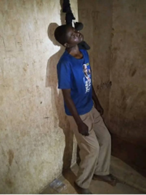The unexplained death of 19-year-old Yarkpowolo Moisemah, a crucial witness in a murder investigation, has plunged Lofa County, Liberia, into a crisis of confidence, raising serious questions about the integrity of the justice system and the safety of witnesses who dare to speak out against violence. Moisemah had bravely identified three suspects in the murder of Monyoungor Keleko, despite receiving threats demanding his silence. He courageously reported these threats to the authorities, leading to the arrest of the named individuals. However, his pursuit of justice met a tragic end while in police custody, initially attributed to suicide, a claim met with widespread skepticism and public outcry. This incident has exposed deep-seated anxieties about the vulnerability of witnesses and the potential for systemic failures within law enforcement.
The initial explanation of suicide did little to quell the growing public unease surrounding Moisemah’s death. The Citizens Actions Committee (CAC), a local civic organization, responded to the rising tide of suspicion by demanding an independent autopsy. The subsequent findings from the Ministry of Justice, confirming that Moisemah’s death was indeed not a suicide but rather unnatural, further fueled suspicions of foul play. The lack of transparency surrounding the investigation, exemplified by the prohibition of live media coverage, exacerbated public distrust and raised concerns about potential attempts to obscure the truth. This decision to restrict media access has been widely criticized as a barrier to accountability and a chilling message to potential witnesses.
The CAC’s concerns extend beyond the immediate circumstances of Moisemah’s death to encompass the broader environment in which it occurred. They highlight the troubling lack of transparency surrounding the investigation and the potential for intimidation or manipulation of witnesses. The prohibition of live media coverage has been interpreted by many as an attempt to control the narrative and prevent public scrutiny of the investigation, thereby hindering the pursuit of justice. This lack of transparency has cast a long shadow over the proceedings, fueling speculation and eroding public trust in the authorities’ ability to conduct a fair and impartial investigation.
Moisemah’s death has become a rallying point for calls for urgent reforms within the Liberian justice system, focusing particularly on witness protection and custodial procedures. Local leaders, religious groups, and human rights organizations have united in their demand for greater accountability and transparency within law enforcement. The fear that silence is safer than truth has permeated the community, highlighting the urgent need to establish robust mechanisms to protect those who come forward with information crucial to criminal investigations. The incident has exposed a deep-seated distrust in law enforcement and the justice system, underscoring the need for comprehensive reforms to restore public confidence.
The Liberian government now faces intense scrutiny over its response to this crisis. Moisemah’s case has become a litmus test for the nation’s commitment to protecting its citizens and upholding the rule of law. The public is watching closely to see whether the government will take decisive action to address the systemic issues highlighted by this tragic event or allow the existing cracks in the justice system to widen. The demand for justice goes beyond simply identifying and prosecuting those responsible for Moisemah’s death. It encompasses a broader call for systemic change to ensure that witnesses are protected, investigations are transparent, and accountability is upheld.
The future of justice in Liberia hangs in the balance. Will Moisemah’s death serve as a catalyst for meaningful reform, prompting the government to implement robust witness protection programs, enhance transparency in investigations, and strengthen custodial procedures? Or will it become another tragic example of impunity, further eroding public trust and emboldening those who seek to silence dissent and obstruct justice? The nation waits anxiously to see how the government will respond, recognizing that its actions in this case will have far-reaching consequences for the future of justice and the rule of law in Liberia. The hope remains that this tragedy will serve as a turning point, prompting the necessary reforms to ensure that such an incident never happens again.














